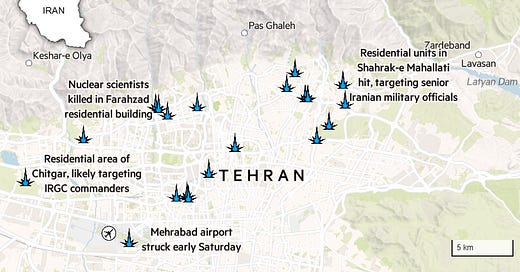Israel Launches Attacks on Iran, Pentagon Mulls Withdrawal from AUKUS, US-China Embrace Temporary Trade War Ceasefire, Tusk Survives Confidence Vote, and More
Grinfi Political Risk Intelligence Weekly Briefing
Welcome to this week’s edition of Grinfi Political Risk Edge, your trusted source for expert political risk analysis and strategic intelligence. In this issue, we examine key geopolitical events shaping the defense, energy, and DeFi markets, providing a deep, beyond-the-headlines assessment. Anticipate, Adapt, and Excel!
But first, let’s begin the week with a laugh 😄 to brighten the mood.
Help us serve you better and improve Grinfi Political Risk Edge by taking this brief, fully anonymized reader survey.
"A nation which can prefer disgrace to danger is prepared for a master, and deserves one."
Alexander Hamilton, ‘The Federalist No. 25: The Powers Necessary to the Common Defense Further Considered,’ The Federalist Papers, 1788. In The Federalist Papers, edited by Clinton Rossiter, New American Library, 1961, p. 164.
Disclaimer: The opinion expressed in this quote does not represent our views but is intended for reflection purposes only.
From Grinfi Political Risk Observatory (GPRO), here’s what we’re monitoring:
High Impact Situational Updates
MAJOR HEADLINES
— Israel Launches Attacks on Iran in ‘Operation Rising Lion’
On June 13, Israel launched ‘Operation Rising Lion’, a large scale air campaign targeting Iranian nuclear facilities, military installations, and senior leadership. The strikes followed the IAEA declaration earlier that day stating that Iran was not in compliance with its nuclear obligations.
Israeli Offensive Operations
Over 200 Israeli Air Force aircraft carried out coordinated strikes on multiple locations, including:
Natanz uranium enrichment facility
Khondab heavy water reactor
Military compounds in Tehran, Isfahan, and several other regions
Confirmed Iranian casualties include:
Major General Hossein Salami, Commander of the Islamic Revolutionary Guard Corps
Major General Mohammad Bagheri, Chief of Staff of the Armed Forces
General Amir Ali Hajizadeh, Commander of the IRGC Aerospace Force
General Mohammad Kazemi, IRGC Intelligence Chief, along with several deputies
Two prominent nuclear scientists
According to the Iranian Health Ministry, at least 224 people were killed, including civilians, and more than 1,200 were injured. A strike near Nobonyad Square in Tehran resulted in 60 civilian deaths, including 20 children.
Subsequent strikes continued through June 15, targeting energy infrastructure, the Iranian Ministry of Defense, and Mashhad Airport.
On June 13, Mossad, Israel’s secret intelligence service, released a rare and blurred video showing its agents operating inside Iran. The footage, as seen below, depicted efforts to weaken Iran’s resistance to Israel’s airstrikes by deploying precision-guided missiles and establishing a covert drone base near Tehran to target Iranian air defenses and missile launchers.
Israeli Rationale
Israeli authorities stated that the operation was designed to significantly delay Iran’s ability to develop a nuclear weapon. Intelligence assessments indicated that Tehran had stockpiled 409 kilograms of uranium enriched to 60% purity, an amount sufficient to produce approximately ten nuclear weapons if further refined. Prime Minister Benjamin Netanyahu confirmed that the operation would continue for as many days as necessary.
Iranian Response
On June 13, Iran initiated ‘Operation True Promise 3’, launching more than 150 ballistic missiles and hundreds of drones in a large scale retaliatory attack targeting Israeli territory.
Key locations targeted included Tel Aviv, Jerusalem, Haifa, Rishon LeZion, the Kirya military headquarters, and multiple airbases.
Most projectiles were intercepted by Israeli systems with the assistance of United States THAAD batteries, the Iron Dome, and coordinated support from Jordan and the United States.
Confirmed Israeli casualties include 13 civilians killed, among them three children, and 174 injured. Damage was reported in Tel Aviv, Bat Yam, Petah Tikva, Rehovot, including the Weizmann Institute, and Ramat Gan.
Further Escalation
Yemen’s Houthi forces declared their support for Iran and launched missiles toward Israel, particularly targeting the Jaffa region.
In response, Israel conducted retaliatory airstrikes in Yemen aimed at assasinating senior Houthi leaders.
Ayatollah Ali Khamenei has appointed Major General Abdolrahim Mousavi as the new Chief of the Iranian Armed Forces and pledged a firm and decisive response.
Iranian leaders have accused the United States of indirect involvement. US President Donald Trump has denied any complicity and rejected Israeli proposals for further escalation, including a plan to assassinate Ayatollah Khamenei.
Diplomatic and Strategic Consequences
Iran is currently evaluating the possible closure of the Strait of Hormuz, though no formal decision has been announced.
Planned United States Iran nuclear negotiations in Oman, originally scheduled for June 15, have been canceled.
Airspace over Israel, Iran, Iraq, Jordan, and Syria was closed on June 13. Partial reopenings began by June 15.
Israel Jordan border crossings remain closed. The Taba crossing into Egypt remains open for travelers who are not Israeli nationals.
Oil prices have sharply risen due to fears of a full-blown regional war. On June 13, Brent crude rose by more than 7%. West Texas Intermediate approached $74.20 per barrel.
Embassy and Consulate Closures
On June 13, Israel ordered the closure of all 104 embassies and consulates worldwide in anticipation of Iranian retaliation.
Israeli diplomatic missions issued warnings advising citizens abroad to avoid publicly displaying national symbols, refrain from disclosing travel plans, and stay away from large public gatherings.
Increased security measures have been implemented in France, Germany, and in several other countries. These precautions follow recent incidents targeting Israeli missions in Washington DC, Bucharest, Belgrade, and Mexico City.
Today, June 16, the U.S. embassy and consulates in Israel remain temporarily closed after an Iranian missile struck near the U.S. consulate in Tel Aviv.
— Pentagon Mulls Withdrawing from AUKUS
On June 11, the Pentagon announced a review of the AUKUS pact, the 2021 trilateral agreement between the United States, Australia, and the United Kingdom designed to counter China’s influence in the Indo-Pacific through the transfer of nuclear-powered submarine technology. The review, led by Undersecretary of Defense for Policy Elbridge Colby, will assess whether the pact aligns with President Donald Trump’s “America First” agenda.








